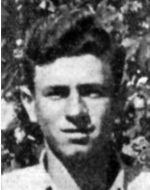Rosenblum, Menachem
Menachem, the son of Tova and Moshe Aharon, was born on April 15, 1929 in Poland, in the city of Pabianice in the Lodz district, grew up and was educated in his hometown, attended elementary school On the eve of the Second World War, The city was occupied by the Germans in September 1939, a few days after the beginning of the war, and in 1940 a ghetto was established, which was one of the first ghettos in Poland, where some 9,000 Jews were concentrated, among them refugees who arrived in the area. Where they were engaged in the manufacture of uniforms for the German army, and in March 1942 all the inhabitants of the ghetto were marked, and those who were fit for forced labor were separated from the others. Some 5,500 Jews who were marked as fit were transferred to the Lodz ghetto, and almost all the rest were taken by train to the Chelmno extermination camp, the first of which was the mass murder of gasses The Nazis liquidated sick people and disabled them from the windows on the building’s floors directly to the street, causing their deaths or serious injuries, thus killing 150 of the hospitalized patients.In 1944 the Fabianica ghetto was liquidated and the rest of its inhabitants deported to Auschwitz. Until the end of the war, almost all the inhabitants of the city were murdered. All members of Menahem’s family perished in the Auschwitz death camp. Only he survived in the camp and reached the day of liberation. After the liberation, Menahem left on the escape route and arrived in Eretz Israel in 1946. He was accepted to his relatives’ home in Rehovot, and shortly thereafter began to work in a trade house. At the outbreak of the War of Independence, Menahem and Tsoref were recruited to Battalion 53 in the Givati Brigade, the 5th Brigade of the Haganah. Since then he has taken part in the battles of the battalion, mainly in the south. On the 17th of Sivan 5708 (17.6.1948) Menahem was killed in a car accident near Be’er Tuvia, and was brought to rest in the military cemetery in Rehovot, (Parents, brothers, sisters, sons and daughters), who experienced the Holocaust in the ghettos and / or concentration and extermination camps and / or in flight and hiding in Nazi-occupied territories and / or in the fighting Along with members of the underground movements or partisans in the Nazi-occupied territories who immigrated to Israel during or after World War II, they wore uniforms and fell in the Israeli army.
